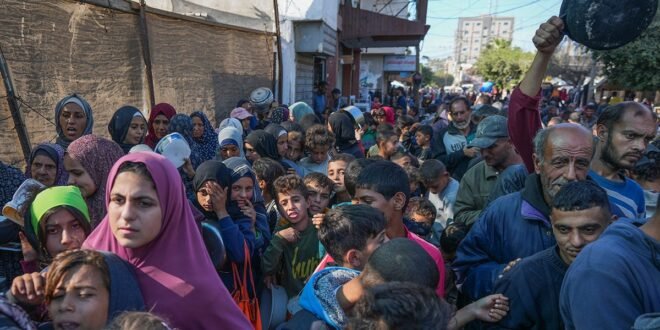The Humanitarian Crisis in Gaza
A heart-wrenching image of a child, held by their mother, reveals the severe impact of the ongoing crisis in the Gaza Strip. The child is so emaciated that the outline of their spine is clearly visible, symbolizing the dire situation faced by many in the region. This photograph highlights the growing hunger crisis, which has become one of the most pressing issues in the area.
The conflict between Israel and Hamas has led to a critical state of food shortages in Gaza. As fighting continues, the situation has deteriorated to the point where over 100 people have died from starvation, according to Palestinian health authorities. The World Health Organization (WHO) reports that a quarter of Gaza’s population is on the brink of starvation, underscoring the severity of the issue.
The root cause of this crisis is attributed to a blockade imposed by Israel, which has effectively halted the import of essential food supplies. This blockade is seen as a “starvation tactic” aimed at pressuring Hamas to release hostages. Despite international criticism, some efforts have been made to address the crisis. The Gaza Humanitarian Foundation (GHF), supported by both Israel and the United States, has initiated food distribution. However, the situation remains far from improved, with many still struggling to meet their basic needs.
International humanitarian law prohibits parties in conflicts from obstructing the distribution of daily commodities to civilians. WHO Director-General Tedros Adhanom Ghebreyesus has expressed deep concern, calling the situation “mass starvation” and emphasizing that it is man-made due to the blockade. His comments highlight the urgent need for action to prevent further loss of life.
Over 30 foreign ministers, including those from Japan, Britain, and France, have condemned Israel’s approach, stating that its delivery model “deprives Gazans of human dignity.” This condemnation reflects a growing global awareness of the humanitarian challenges faced by the people of Gaza.
In addition to the suffering of Gazans, local journalists reporting on the damage caused by attacks are also facing a food crisis. Reuters and three other international media outlets issued a joint statement expressing alarm over the situation, noting that these journalists are increasingly unable to feed themselves and their families.
In response to calls for lifting restrictions on supply deliveries, Israel has temporarily halted combat operations and established routes for vehicles carrying food and other goods to pass safely. While this decision is welcomed, a United Nations official has emphasized the need for large-scale and continuous aid, urging the full resumption of supply deliveries.
Tragedies continue to unfold in connection with aid distribution. There have been repeated incidents of shootings at GHF centers, resulting in over 800 deaths. The Israeli military has denied targeting civilians, claiming that only “warning shots” were fired. However, given its control over the area, it bears responsibility for ensuring the safety of residents.
With little time left to save Gaza residents from hunger, it is imperative that Israel refrains from using food as a “weapon.” The international community must intensify pressure to avert a full-blown humanitarian crisis. Immediate and sustained action is needed to provide relief and ensure that no more lives are lost due to the ongoing conflict.
 Info Malang Raya Its All About World News
Info Malang Raya Its All About World News




